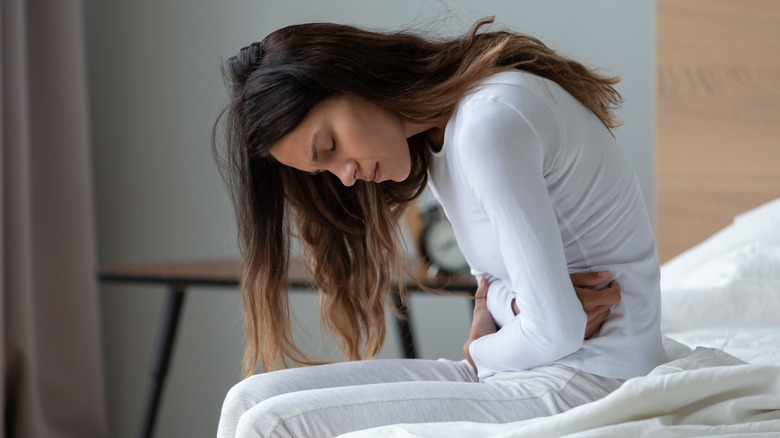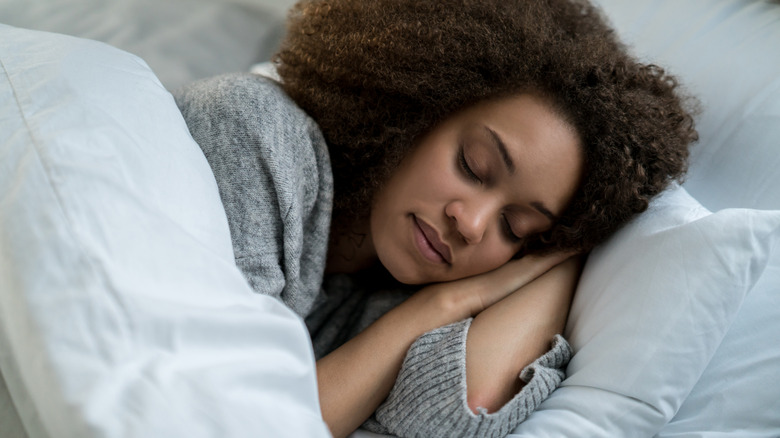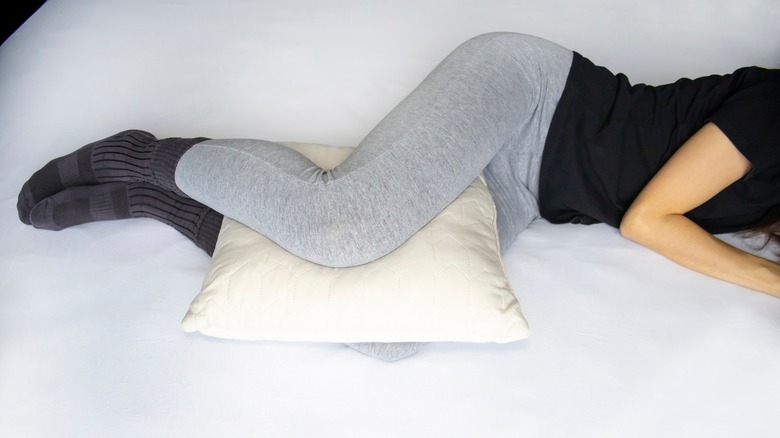The Best Sleep Position For When Your Stomach Is Bloated
Bloating can happen for several reasons. You might have just had too much fiber in the day, or you have food intolerances, or perhaps it's something more serious like irritable bowel syndrome (IBS) or gastroesophageal reflux disease (GERD).
Whatever the reason, sleeping when you feel like there's gas or poop stuck in your GI tract isn't fun. You might find yourself tossing and turning, trying to get comfortable. But experts have the best sleeping position to relieve these symptoms of painful bloating — on your left side. Coincidentally, it's also the best sleep position if you have an upset stomach or heartburn.
Since your stomach is located on the upper left side of your abdomen, the theory is that gravity will help food and waste to pass more easily through your digestive tract when you sleep on your left side. As explained by internal medicine associate consultant, Dr. Manira Dhasmana, per The Indian Express, "Left-side sleeping has more health benefits as it easily transfers our digested food from our small intestine to the large intestine." Finding a sleeping position that works is not just about getting relief when feeling bloated.
The relationship between gut health and sleep
A lot can be said about why we need quality sleep. In addition to giving you energy to get through the day, sleep protects your immune system and also your gut health. For starters, not sleeping enough or well can throw your hunger and satiation hormones out of whack, which might contribute toward overeating or late-night snacking. This can eventually lead to more gastrointestinal discomfort like feeling bloated in the morning, explained registered dietitian, Nataly Komova (via SheFinds).
A lack of sleep might also mean you're more stressed and stress can negatively impact your gut health too, explained functional lifestyle medicine physician with Henry Ford Health, Dr. Ryan Barish. "Increased stress can cause intestinal permeability issues — or something known as leaky gut — where food and toxins can pass through the intestine and into the bloodstream. This can lead to a host of issues including bloating, inflammation, stomach pains, food sensitivities, and changes to the gut microbiome," explained the expert. Inflammation because of lack of sleep is also bad news for people with irritable bowel diseases (IBD) like Crohn's and ulcerative colitis.
That being said, the relationship between gut health and sleep can often feel like a vicious cycle. Not sleeping enough can make digestive issues worse and gastrointestinal symptoms like bloating and heartburn often cause disruptions to sleep. While those who are battling bloating from a one-time food intolerance or excessive fiber intake might be able to relieve discomfort by flipping onto their side, for those with underlying issues, more trial and error with sleeping positions might be needed.
How to get comfortable sleeping on your left side
For some experts, relieving gastrointestinal discomfort is more about finding a sleeping position that works for you. While it might be sleeping on the left for you, the same might not work for someone else who's dealing with a GI issue.
But the concept of sleeping on your left side to relieve bloating seems widely recommended. If you're going to try this out and you've never slept on your side before, it might prove a bit challenging. Most of us don't realize how attached we are to our sleeping positions until we try to change things up. To make things more comfortable, try sliding a pillow between your legs to keep your spine in a neutral position and to prevent your knees from knocking together. You can also add a body pillow into the mix. It might make the transition from sleeping on your back or stomach all the more smoother.
Speaking of stomach sleeping, experts agree that this is the worst sleep position for when you're feeling bloated. The pressure on your stomach can increase gastrointestinal discomfort. There are also a few other things you can do to avoid feeling full and uncomfortable when you go to bed. Eating three hours before bedtime, maintaining proper hydration throughout the day to aid digestion, and sticking to a proper sleep schedule can all help. These are tricks to get rid of bloating that work.



